4 Acts of Forgiveness to Heal Burnout
By: Aorn Staff
Published: 5/5/2022
4 Acts of Forgiveness to Heal Burnout

April 24, 2022
In celebration of National Nurses Month, AORN is shining a light on perioperative nurses making a difference. The month of May is also recognized as our National Mental Health Month. In a coalescence of these two important topics, we spoke with Rebecca Lessinger, MSN, RN, CNOR, on the work she’s been doing to support nurse mental wellbeing.
Coping Through the Pandemic
Lessinger witnessed the stress and anger periop professionals experienced during the pandemic and noticed one common factor that kept them from healing: A reluctance to let it go.
Often the stresses resulted from inter-professional conflicts and toxic encounters that continued to fester.
In her role as a Surgical Services Educator, Lessinger wanted to find tools to support her colleagues and turned to the Stanford Forgiveness Project led by Frederic Luskin, PhD.
Teaching Nurses to Forgive
“I discovered giving yourself permission to forgive the person or situation plaguing you creates a way to replace toxic anger with inner peace and strength,” says Lessinger.
Since completing the program, she’s felt passionate about sharing the work with other nurses. She’s mentored team members and recently presented the 9-step program during AORN’s annual conference in March.
Lessinger says to start with these first four acts of forgiveness from the Stanford project to protect your mental health.
- Act 1: Be able to explain to yourself and a few others you trust the details of the hurtful incident bothering you.
- Act 2: Commit to releasing yourself from the suffering you have experienced because of this hurtful incident. Realize that the act of forgiving benefits you because you deserve to be released from these negative feelings and find peace.
- Act 3: Know your forgiveness goal to feel better. Realize the damage that you have experienced from holding a grudge and see the value of lessening the blame you harbor. Remember that your end goal is to achieve peace and understanding.
- Act 4: Think about your perspective on what happened and acknowledge that your current distress is being fed by your hurt feelings now, not what occurred in the original hurtful incident.
Lessinger stresses that “we need to incorporate continuous self-care strategies like forgiveness into our lives for optimal mental health in the long-term.” She suggests taking time to work on forgiveness every day (ideally), or on a weekly, or (at the very least) monthly basis to keep ourselves, our loved ones, and our work environments healthy and happy.
Feeling empowered to strengthen your mental health? Learn more from Lessinger about the complete 9-Step Forgiveness Exercise in her education session on “Self-Care and Burnout Prevention” now available with the Virtual Pass to AORN Expo 2022.

